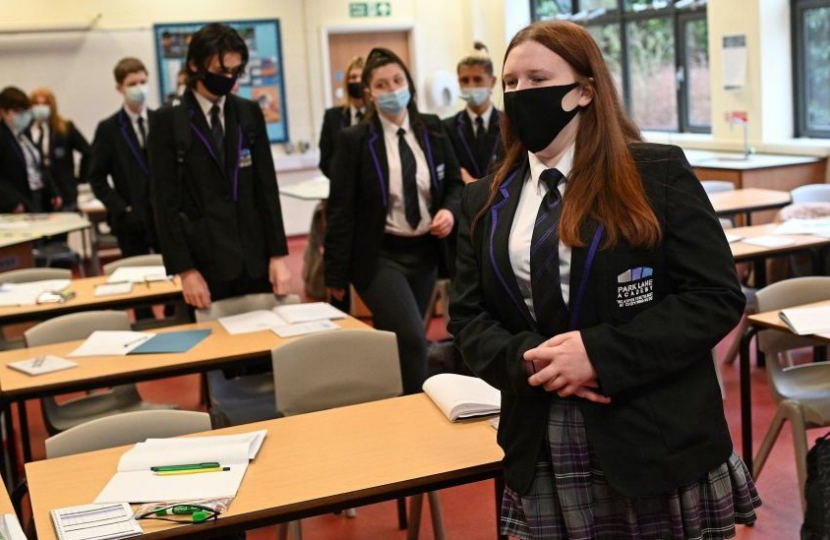
First reported in Conservative Home
For me, the major concern presented by Omicron is not so much about whether we will be sitting down to Christmas dinner this year, but whether the country is moving again towards de facto school closures.
Even with the vaccination of millions of teachers, support staff and pupils over aged 12, hundreds of thousands of children are still being sent home to isolate. According to the Department for Education’s latest figures, as of November 11 2021, 130,000 of all pupils on roll in state-funded schools did not attend school for Covid-19 related reasons.
Dr Jenny Harries, Chief Executive of the UK Health Security Agency, confirmed directly to me that, like other forms of Covid, thankfully, children are less at risk from the new variant. Moreover, children are not significant vectors for transmission.
Readers may recall from my last column that I recently introduced a 10 Minute Rule Bill, backed by the current and former Children’s Commissioners, and by two previous Children’s Ministers, which aims to prevent future school closures.
The Bill would introduce a ‘triple lock’ of protections to safeguard against any future school closures, except in cases of extreme emergency. The Government would have to seek the advice of the Children’s Commissioner on the necessity of closing schools, hold a debate and vote in Parliament to agree the measure, and then seek the further advice of the Children’s Commissioner and a further vote by Parliament every three weeks to place a strict time-limit on any future disruption.
Ministers follow the science and advice from SAGE and the JCVI when it comes to our health, so it is only logical that they must also follow the advice provided by the Children’s Commissioner and those with the best interests of our children at the heart of their mandate.
Statistics published by the Education Policy Institute show that primary aged children were 3.4 and 2.2 months behind in maths and reading. For disadvantaged pupils, this is even great with 4.2 months and 2.7 months of lost learning respectively.
In 2019-20, the number of children being referred for mental health treatment soared by 60 per cent. In the same year, there was a 46 per cent rise in child eating disorder referrals.
The question that policymakers should be asked is: when considering the risks of Covid to children (minimal – thank goodness), do they also consider the perhaps bigger risk of creating a secondary mental health epidemic, and damage to children’s life chances and educational attainment?
There are three measures the DfE should take to combat these rising mental health challenges.
First, every child must receive a mental health assessment. This is important to understand the full scale of the problem.
Second, Ministers should rocket-boost the proposal in the recent Young People’s Mental Health Green Paper to place a designated senior mental health lead in every school by 2025.
The What Works Centre for Wellbeing has identified that good mental health and wellbeing at age 14-15 has a significant and positive association with educational attainment at age 18. Furthermore, research published by the DfE shows that pupils with better emotional wellbeing at age seven were more than one term ahead of pupils with poorer emotional wellbeing.
Third, we know that social media is like a wrecking ball for young people’s mental health.
According to NHS Digital, 16.7 per cent of children aged 11-16 said the numbers of ‘likes’, ‘comments’, or ‘shares’ they received had a significant impact on their mood. The Royal Society for Public Health found that one in six young people will experience an anxiety disorder at some point in their life and that four of the five most used social media platforms make their feelings of anxiety worse.
Perhaps most tellingly of all, a USA Congressional hearing on social media showed that Facebook knew about the harmful mental health effects that Instagram was having on young girls.
The Treasury should introduce a mental health levy for social media giants. Ofcom published a report earlier this year which stated the revenue for social media companies is £4.8 billion. Introducing a two per cent levy could create a funding pot of around £100 million. This could then be distributed to schools to provide mental health support and digital skills training for young people to build the resilience and online safety skills they need.
Teaching and implementing resilience tools and techniques as a means of preventing worsening mental health are fundamental.
I recently visited Newham Collegiate Sixth Form and met with students. The Headteacher described the preventative work they do in the school to help equip students with the mental health tools they need to cope with the hurdles the world puts in their path.
For example, a coach is employed to work with students to develop techniques to conquer their anxieties and school assemblies are utilised to teach the tools needed to help manage highly pressured environments. In private study periods, the desks are set up to resemble an exam hall to help pupils become familiar with the setting so when it comes to a real exam, it does not trigger a reaction causing the student to underperform.
As the Head said to me: “Whilst recognising the seriousness of mental health diagnoses when they occur, we mustn’t allow the narrative of ‘mental health’ to become the crutch that every little challenge is defined under”.
Prevention and resilience are the key weapons that should be amassed to build this arsenal of tools and techniques which can be replicated across the country to conquer poor mental health in our children.
Above all, ensuring that schools are not a revolving door of openings and closures for children is the best way to support young people’s mental health and improve their educational attainment and life chances.
